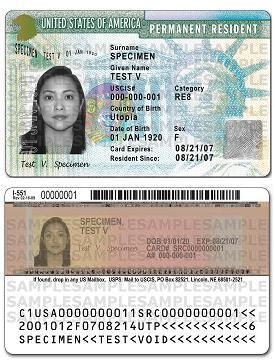Lawful Permanent Residency (Green Card)
Immediate Relatives | Non-immediate Relatives | Other ways to obtain a green card
Spouses, Parents, and Minor Children of U.S. Citizens

How smoothly the green card process goes depends on which relative the U.S. citizen is applying for and whether the relative has ever been in the U.S. It is also helpful to know what documents the government will need in order to issue a green card.
The time it takes to obtain a green card depends heavily on the relationship between the person applying and the person obtaining the green card. If the person is a spouse, parent, or child (defined as being single and under 21 years old) of a U.S. citizen then the process is relatively short.
The next question is where the relative must go to process the green card. If the relative is outside the U.S. — and no waiver is needed — then the case is processed through the consulate or embassy in the foreign country where the relative is located. This process lasts between 9-12 months. If a waiver is needed then the process can take significantly longer. To determine if a waiver is needed it is best to talk with an experienced Immigration lawyer.
If the relative is inside the U.S. then the green card can be issued without any need for the relative to leave as long as one of two conditions are met. First, the relative can obtain a green card without leaving the U.S. if an I-130 application was filed before April 30, 2001 and a penalty fee of $1,000 is paid. Or second, the relative can obtain a green card without leaving the U.S. if the relative entered the U.S. legally. This is typically seen when a relative enters on a tourist visa or enters under the visa waiver program. It is important to note that if neither of these two options apply then the relative must obtain the green card through consular processing. Unfortunately, many relatives leave for their foreign interview and later the consulate requires that the relative file for a waiver. Often, a waiver is not available and the relative is then forced to stay outside of the U.S. for ten years, sometimes more. Before leaving for any foreign consular appointment it is a good idea to speak with an experienced Immigration lawyer to avoid unforeseen problems. A good lawyer will keep you out of problems, not just fix problems you are already in.
The U.S. government currently charges approximately $1,500 for the green card process. If the relative did not enter the U.S. legally then the government will charge approximately $2,500. If the U.S. citizen’s relative will obtain the green card through a consulate then the fees are less. In these circumstances the fees are approximately $1,000. If a waiver is needed the cost is about $1,500. Attorney’s fees are paid separate from these amounts.
The typical documents that are needed to obtain a green card include the U.S. citizen’s proof of citizenship (e.g., U.S. passport, birth certificate, naturalization certificate), the relative’s birth certificate and certified English translation, birth certificates of any children, a current marriage license (if applicable), divorce decrees (if applicable), and a medical exam. The U.S. citizen must also meet certain income requirements and provide the 3 most recent yearly tax returns, with W-2s. If the U.S. citizen is unable to show sufficient income then a co-sponsor must also apply.
Other Relatives of U.S. Citizens
For those relatives not listed above the wait times are significantly longer. The U.S. Department of State maintains the visa bulletin that shows what application dates are current. These dates are divided into four categories. Unmarried sons and daughters of U.S. citizens make up the first category. Applications sent by a lawful permanent resident make up the second category. The third category contains applications on behalf of married sons and daughters of U.S. citizens. The fourth category is for brothers and sisters of U.S. citizens.
A common question is what happens to the relative’s spouse and children when the relative obtains a green card. The answer is that the relative’s family is eligible to obtain green cards as well. The exception to this rule is that children over 21 or married children often do not qualify. However, under some circumstances children over 21 might still be able to obtain a green card. This is an issue that an experienced Immigration lawyer can help with.
If the relative has ever been in the U.S. — despite currently being outside of the U.S. — then the relative may be required to file a waiver. Waivers are a very complicated area of Immigration law and should not be attempted without first speaking with a lawyer. Under some circumstances a waiver can be applied for but under other cases a waiver is unavailable and the relative may be required to spend 10 years or longer outside of the U.S. A short conversation with an Immigration lawyer can save a lot of heartache in these cases.
Other Ways to Obtain a Green Card
It is also possible to obtain a green card even if a person does not have a U.S. citizen or resident family member. For example, a person who applied for asylum and was approved may apply for residency one year after the asylum approval. It is also possible to obtain a green card under certain work applications or if a person invests a certain amount of money into the U.S. economy and generates jobs.
Another common way of obtaining a green card is if a person is victimized. For more information on what crimes qualify a person please click on the Victims link at the top of this page.
